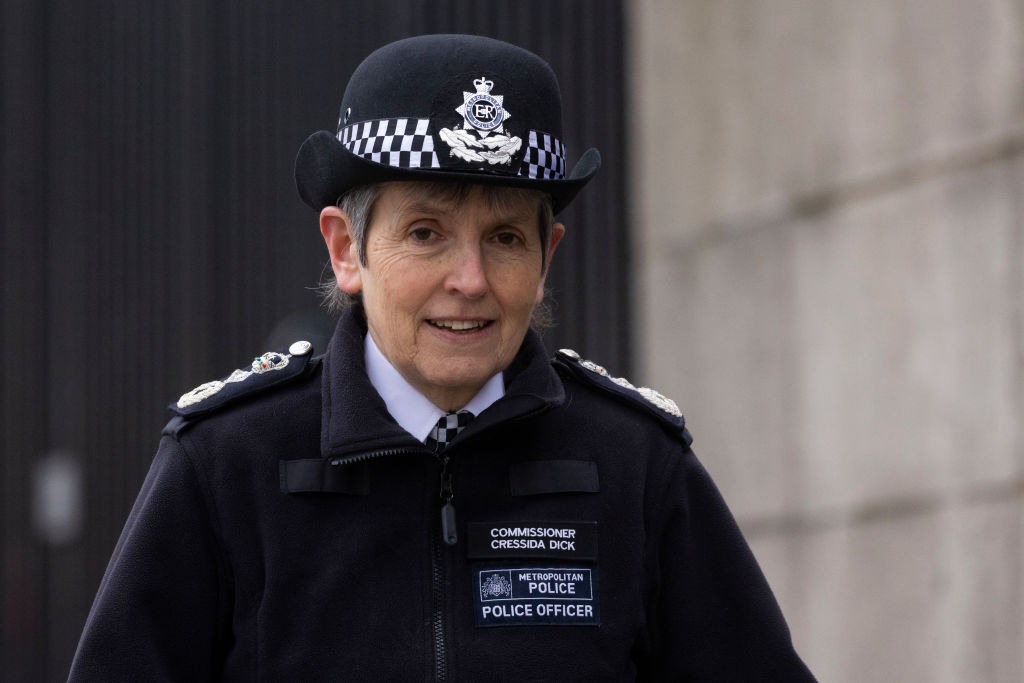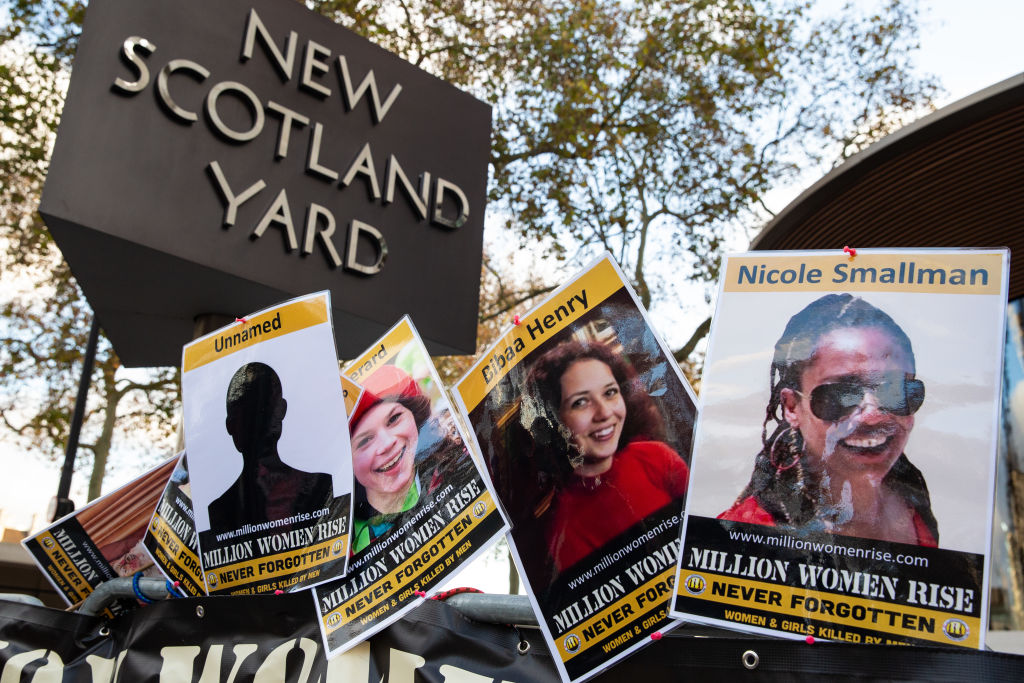
The head of Britain’s largest police force was forced to resign Feb. 10 after the mayor of London accused her of failing to root out a culture of racism and misogyny. Metropolitan Police commissioner Cressida Dick’s exit from the force was announced amid its ongoing investigation into allegations that Prime Minister Boris Johnson broke lockdown restrictions by attending numerous parties held at Downing Street. The news adds to mounting pressure on the Prime Minister to end his scandal-hit premiership. Here’s what you need to know:
Why did Cressida Dick resign?
Dick has been the commissioner of the London Metropolitan Policesince 2017. Her five-year term was extended until 2024 last September by the U.K.’s Home Secretary Priti Patel, despite increasing scrutiny over her handling of a series of scandals in the force.
Yet, in a surprise statement Feb. 10, Dick suggested that she was forced out by London’s mayor, Sadiq Khan. “It is with huge sadness that, following contact with the mayor of London today, it is clear that the mayor no longer has sufficient confidence in my leadership to continue,” she said. “He has left me no choice but to step aside as commissioner of the Metropolitan police service.”
Khan had put Dick “on notice” Feb. 2 following the publication of a police watchdog report into “disgraceful” discrimination and bullying among officers based in a central London station, a mayoral spokesperson said in a statement. The spokesperson said Sadiq Khan told Dame Cressida of his anger at “a return to the bad days of the Met of his childhood in the 1970s and 80s”.
Just hours before she was due to meet Khan on Feb. 10, Dick told a radio station that she had “absolutely no intention” of stepping down and had a plan to root out a culture of misogyny and racism in the force. Khan later told Dick’s aides that the plan she outlined was inadequate, so she decided to boycott their scheduled meeting and instead announced her resignation.
What have the Metropolitan Police been accused of?
Dick, the first ever woman leader of the Met Police force was accused of presiding over a culture of sexism and racism following a series of high profile scandals.
Following nine linked investigations, an independent police watchdog revealed shocking evidence Feb. 1 that officers in Charing Cross, central London, had engaged in conduct involving misogyny, homophobia, bullying and sexual harassment between 2016 and 2018. The report claimed that officers had engaged in sexual activity while on duty, joked about hitting and raping women, and mocked the deaths of black babies and the Holocaust. In published Whatsapp messages, one male officer told to a female officer: “I would happily rape you…if I was single I would happily chloroform you.” Two of the officers investigated were promoted, while nine were left to serve in the Met.
In a statement, the Met Police said that “the conduct of a team of officers at Charing Cross Police Station in central London does not represent the values” of the wider force.
But it’s not the only scandal the police force has been embroiled in recently. In March 2021, a serving Metropolitan Police officer kidnapped 33-year-old Sarah Everard while she was walking home and later murdered her. During a vigil held days after Everard’s body was found, police used force to break up the crowds, on the basis that the vigil broke COVID-19 restrictions.
The Met continued to underestimate the seriousness of public distrust following their handling of the murder. Days after the killer’s sentencing, the force’s leadership suggested that women “wave a bus down” if approached by a male police officer they feared might not be genuine.

Faced with scandal after scandal, the Met struggled to recover its reputation. In December, two officers were found guilty of misconduct in public office after taking and sharing selfies with the bodies of two Black women women who had been murdered “for their own amusement.” The officers were each sentenced to two years and nine months in prison.
The force has long faced allegations of racist policing tactics, specifically the use of “stop-and-search” powers, which allow officers to judge whether someone may have committed a crime. The tactic has been accused of encouraging racial profiling and had led to distrust of the police by Black communities in London that has not subsided under Dick’s tenure.
What is the Met Police force’s connection to the ‘partygate’ scandal?
The Met Police’s stance on the ‘partygate’ scandal embroiling Boris Johnson and his Conservative government has led some lawmakers to accuse the force of staging a “cover-up”.
Johnson and his staff are facing allegations that they attended a series of parties in Downing Street during COVID-19 restrictions which banned social gatherings. Senior civil servant Sue Gray is overseeing an independent inquiry into the allegations. The Met, however, said Jan. 13 that it would not look into the events until Gray’s report was published, and claimed it did not normally investigate breaches of pandemic regulations “long after they are said to have taken place”.
However, the Met backtracked just days before the publication of Gray’s report was due Jan. 31 and announced its own investigation. It asked the senior civil servant to make only “minimal reference” to the parties in her report which were now under investigation, in order to “avoid any prejudice to [the police] investigation.” Gray was forced to publish a heavily redacted version of her report which, although damning, could not go into detail.
The Met Police have previously been accused of interfering with sensitive investigations. The force was described as “institutionally corrupt” by an independent inquiry set up to review the murder of the private detective Daniel Morgan in 1987. Dick was singled out in the report for obstructing the panel’s investigation.
What does Dick’s resignation mean for Boris Johnson?
The Met commissioner’s resignation comes at a politically sensitive time for the Prime Minister. Only a day before Dick’s resignation, the Met announced it had sent legal questionnaires to more than 50 people in Downing Street and Whitehall in connection with the alleged gatherings. It is expected that Johnson will be included.
The Prime Minister is facing mounting pressure even from his own party to step aside, an unsavory outcome of the police investigation or any evidence of a “cover-up”, could be the catalyst.
Dick was seen by some as an ally to Johnson. Patel said following Dick’s resignation that “strong and decisive leadership” would be required to rebuild public confidence in the force’s “integrity and professionalism,” The Independent reported. As a member of the Labour Party, London mayor Khan did not have the same allegiances to the Met commissioner as the Conservative lawmakers in Downing Street, who have been in power throughout Dick’s tenure.
Opposition lawmakers have pointed to an overly close relationship between the police and politicians. “Boris Johnson must have no role in choosing Cressida Dick’s successor to lead the Met,” said Ed Davey, leader of the Liberal Democrat party, in a tweet. “A man under criminal investigation by the Met should not be able to choose who’s in charge of it.”
Given the extent of public distrust in both the government and the Met Police, the force will struggle to delay Gray’s full report any further. Met sources told the Guardian that Dick’s departure will not change the progress of the criminal investigation into the alleged parties. She will stay in the position for a short period until a replacement is found.
More Must-Reads From TIME
- The 100 Most Influential People of 2024
- The Revolution of Yulia Navalnaya
- 6 Compliments That Land Every Time
- What's the Deal With the Bitcoin Halving?
- If You're Dating Right Now , You're Brave: Column
- The AI That Could Heal a Divided Internet
- Fallout Is a Brilliant Model for the Future of Video Game Adaptations
- Want Weekly Recs on What to Watch, Read, and More? Sign Up for Worth Your Time
Contact us at letters@time.com